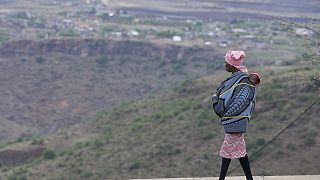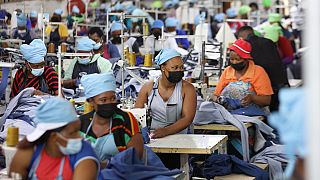Lesotho
Voters across the picturesque mountain kingdom of Lesotho are heading to the polls Friday to elect a leader to find solutions to high unemployment and crime.
The southern African country of 2.1 million people has more than 60 registered political parties but the election is expected to be a three-way contest.
Outgoing Deputy Prime Minister Mathibeli Mokhothu of the Democratic Congress party is in a close race against his current coalition partner Nkaku Kabi of the All Basotho Convention and businessman-turned-politician Sam Matekane of the Revolution for Prosperity.
Lesotho’s King Letsie III presides over a constitutional monarchy but has virtually no political power. Whichever party wins enough representatives in Lesotho’s 120-seat National Assembly to form a government will select the new prime minister. With so many parties contesting the election, a coalition is very likely, say experts.
Amnesty International has urged all parties to uphold basic rights during and after the election.
“A dangerous pattern of human rights violations, including torture, unlawful killings, and excessive use of force by members of the security forces in Lesotho has been a common feature of the past five years under the current coalition government,” Muleya Mwananyanda, Amnesty’s director for East and Southern Africa, wrote last week.
“Political candidates vying for leadership positions, including parliamentary seats, in the upcoming general elections must make a commitment to put respect for human rights and accountability for past human rights violations front and centre of their campaigns,” wrote Mwananyanda. “If elected, they must ensure access to justice and effective remedies for the victims of these human rights crimes.”
Election observers from the European Union, the Commonwealth, the African Union and the Southern African Development Community are in Lesotho to assess the electoral process.
Of the three leading candidates, Matekane is the only one who has never been in government. A savvy multi-millionaire businessman, he claims he would best be able to tackle Lesotho’s unemployment. Matekane has promised to expand markets for garments manufactured in Lesotho and to diversify the products exported to the U.S. under the African Growth Opportunities Act trade concession.
The garment-making industry is Lesotho’s largest employer after the government and had more than 45,500 textile workers at the beginning of 2020, according to official statistics. But about 25% of those workers lost their jobs amid the global economic slump caused by COVID-19.
The scourge of crime is a pressing campaign issue. Lesotho suffered 41 murders per 100,000 people, Africa’s highest and considerably worse than the world average of 7 per 100,000, according to the World Population Review.
Whichever party wins power will have to adequately resource the entire law enforcement sector — from the police to the judiciary — to arrest suspects and prosecute the trials to finality, according to crime experts. Lesotho currently has a backlog of criminal cases estimated to be about 4,000 by senior judicial officials.
The traditional Famo music gangs are blamed for turf wars and violent shootings in Lesotho and neighbouring South Africa where the gangs also are involved in illegal mining at abandoned sites.
One Famo gang leader, Sarele Sello, is wanted by South Africa’s police for the murder of 16 patrons at a Soweto tavern in July but that hasn’t kept him out of Lesotho’s political campaign. Earlier this week Sello was feted at a campaign rally in the capital, Maseru, and pledged his support for the All Basotho Convention party.
A new government will also be challenged to implement wide-ranging reforms to the judiciary, parliament and media which were recommended by the 16-nation Southern Africa Development Community ADC to end chronic political instability.
Lesotho’s subsistence farming practices must be improved to help end chronic food insecurity. About 320,000 people in Lesotho are currently experiencing a severe food “crisis” and are in urgent need of aid “to save lives, reduce food gaps, protect and restore livelihoods and prevent acute malnutrition,” according to the Integrated Food Security Phase Classification, based at the FAO offices in Rome.












01:05
Lesotho declares two-year state of disaster amid US tariff fallout
01:07
Burundi’s ruling party wins all parliamentary seats amid fraud claims
Go to video
Burundians vote to elect lawmakers and local leaders
01:59
Burundi: Official launch of campaign season ahead of june 2025 legislative and local elections
Go to video
Prince Harry accused of orchestrating a bullying and harassment campaign
00:52
Former Mauritian prime minister arrested in money-laundering probe